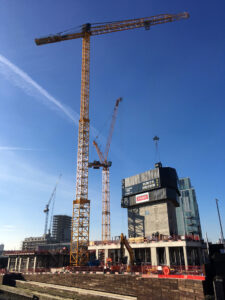


Section 60 & 61 Notices – Construction Noise
Sections 60 and 61 of the Control of Pollution Act 1974 (the Act) deal with the control of noise and ‘prior consent for work’ on construction sites.
What is a Section 60 Notice?
The local authority may impose noise control requirements (typically via conditions attached to a planning consent) on a person or company (the Contractor) when they carry out engineering works. The notice may specify:
- Working practices (e.g. methodology or equipment);
- Working hours;
- Noise limits for the site, possibly including specified hours.
The Act requires that in serving notices the local authority should have regard to:
- Ensuring that “best practicable means” are employed by the Contractor to minimise noise;
- Making the Contractor aware of other methods or plant or machinery that the local authority considers more acceptable; and
- Protecting any ‘sensitive receptors’ near the site from the effects of noise.
 Construction noise monitoring at Ocean Village, Southampton for Bouygues
Construction noise monitoring at Ocean Village, Southampton for Bouygues
What’s the Problem with a Section 60 Notice?
A Section 60 notice may be served by the local authority at any time without consultation with the Contractor or developer. Furthermore, the requirement under a Section 60 notice can be made more onerous if the local authority receives and upholds complaint in the vicinity. This can have significant implications for the programming and costs of the works.
Failure to comply with a Section 60 notice is an offence without “reasonable excuse” and can lead to prosecution in a Magistrates Court.
What’s the Alternative?
The Contractor may apply to the local authority to start work under a Section 61 Agreement. The Agreement must be completed prior to the start of construction work and requires the Contractor (typically in conjunction with their acoustics consultants) to provide detailed information on:
- The works and the method by which they are to be carried out; and
- Measures to minimise noise resulting from the works.
If the local authority approves the Section 61 application then legally they cannot serve the Contractor with any Section 60 notices throughout the construction programme, provided that the Agreement is adhered to. This protection can be an attractive approach for sites where noise or vibration is likely to be an issue.
In our experience Section 61 Agreements can take some time to negotiate, especially for complex construction sites. However, once an application has been submitted, the local authority must inform the applicant of its decision within 28 days.
 Monitoring Noise & Vibration at Creekside, Greenwich for Essential Living
Monitoring Noise & Vibration at Creekside, Greenwich for Essential Living
How Can We Help?
- We can accurately and cost-effectively calculate noise emissions;
- We can advise the Contractor or design team on appropriate noise reduction measures having regard to programming and cost implications;
- We can assist the Contractor in negotiating and securing suitable Section 61 agreements;
- We can provide assistance with temporary or permanent noise, vibration and dust monitoring to comply with any obligations imposed under Section 60 or 61 of the Act, or in the event of complaints.








